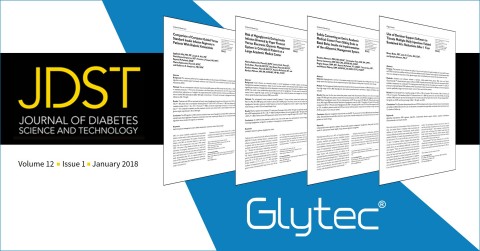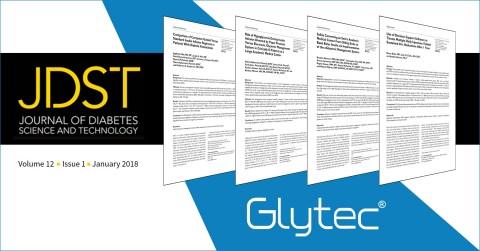WALTHAM, Mass.--(BUSINESS WIRE)--Four new studies published in the January 2018 issue of Journal of Diabetes Science and Technology (JDST) demonstrate superior patient outcomes and organizational performance with Glytec’s eGlycemic Management System® (eGMS®) versus conventional, paper-based protocols. In all instances, which included both inpatient and outpatient settings, use of eGMS® for diabetes and insulin therapy management was observed to be safer and more effective than ‘usual care,’ with lower rates of hypoglycemia, faster resolution of diabetic ketoacidosis (DKA), expedited time to target glucose, and sustained reductions in A1c. Additionally, use of eGMS® led to substantive efficiency gains in provider workflows, fewer point-of-care tests, shorter lengths of stay, and full adoption of best practices, including 96% utilization of basal bolus insulin.
Highlights of the four studies follow:
Comparison
of Computer-Guided Versus Standard Insulin Infusion Regimens in Patients
With Diabetic Ketoacidosis
Lead Author: Jagdeesh Ullal, MD,
MS
This retrospective study included 2,665 adult patients with DKA who received intravenous insulin therapy in an intensive care or step-down unit at one of 34 institutions. A total of 1,750 patients were treated using eGMS® and 915 using conventional, paper-based protocols.
- 21% faster resolution of metabolic ketoacidosis (bicarbonate ≥18 mmol/L) using eGMS®: 13.6 vs 17.3 hours.
- 93% reduction in severe hypoglycemia (blood glucose <40 mg/dL) using eGMS®: 0.46% vs 6.6% patients.
- 29% (1.3 days) shorter average length of stay using eGMS®: 3.2 vs 4.5 days.
Risk
of Hypoglycemia During Insulin Infusion Directed by Paper Protocol
Versus Electronic Glycemic Management System in Critically Ill Patients
at a Large Academic Medical Center
Lead Author: Marina
Rabinovich, PharmD, BCPS
This retrospective study included 54 critically ill adult patients admitted to a medical, surgical/trauma, neuroscience or burn intensive care unit at Grady Memorial Hospital in Atlanta, Georgia. Half were treated using eGMS®, the other half using conventional, paper-based protocols.
- 99% reduction in severe hypoglycemia (blood glucose <40 mg/dL) using eGMS®: 0.01% vs 5.4% patient days.
- 94% decrease in hypoglycemia (blood glucose <70 mg/dL) using eGMS®: 1.3% vs 21.5% patient days.
- 51% increase in the amount of time spent within the target glucose range (110-180 mg/dL) using eGMS®: 63.7% vs 31.5% patient days.
Safely
Converting an Entire Academic Medical Center From Sliding Scale to Basal
Bolus Insulin via Implementation of the eGlycemic Management System
Lead
Author: Rosalina Newsom, MSN, RN, NE-BC
This retrospective quality improvement study included adult patients with and without diabetes who received intravenous and/or subcutaneous insulin therapy during admission to Kaweah Delta Medical Center, a 580-bed academic medical center in Visalia, California. The journey of converting from sliding scale to basal bolus insulin is described, and organizational performance before eGMS® is contrasted to the first year following implementation.
- 2,434 fewer hypoglycemic events and 40,589 fewer hyperglycemic events using eGMS®.
- 37% (3.18 days) shorter average length of stay using eGMS®: 5.51 days vs 8.69 days.
- 47% decrease in the number of point-of-care blood glucose tests using eGMS®: 26.8 vs 50.9 tests per patient.
- Growth in utilization of basal bolus insulin from 5% to 96% using eGMS®.
- 91% less time spent on daily insulin titration per prescriber per patient using eGMS® versus manual basal bolus protocols: 20.2 seconds vs 219.7 seconds.
Use
of Decision Support Software to Titrate Multiple Daily Injections
Yielded Sustained A1c Reductions After 1 Year
Lead Author:
Bruce Bode, MD
This quality improvement project included 46 adult outpatients with type 1 or type 2 diabetes and a baseline A1c greater than 9% who received care from a specialty diabetes clinic. All were treated using Glucommander™ Outpatient (core eGMS® module), which allowed for insulin titration to be performed remotely (i.e., on a virtual basis) between clinic visits.
- 3.1% absolute decrease in A1c over 12 months: baseline average of 10.3% to 7.8% at three months, 7.8% at six months, 7.8% at nine months and 7.2% at 12 months.
- Median of seven days for patients to reach their prescribed glucose goal (three consecutive days with average daily blood glucose <180 mg/dL).
- Number of severe hypoglycemic events (blood glucose <40 mg/dL) at 0.05%: 18 of 36,315 blood glucose values.
Raymie
McFarland, Vice President of Quality Initiatives at Glytec, says:
“It’s a great privilege to have worked with so many clinicians who are
passionate about improving glycemic management in and out of the
hospital, and are willing to do the hard work that research studies like
these entail. It’s also a great privilege to have these studies
published in the Journal of Diabetes Science and Technology,
whose editor-in-chief, Dr.
David Klonoff, has created a truly one-of-a-kind medium for
advancing the research of diabetes technologies.”
About Glytec
Founded in 2006, Glytec is the pioneer of personalized digital therapeutics. The company’s patented and FDA-cleared software-as-a-medical-device solutions improve the safety and health of people with diabetes and make insulin a more effective medication option for the millions unable to achieve their treatment goals. Glytec combines evidence-based decision support technologies with expert clinical services to optimize basal and bolus insulin therapies in the hospital and at home, and reduce hypoglycemia and other complications as well as avoidable ED visits, hospitalizations, readmissions and drug waste. The company has offices in Waltham, Massachusetts and Greenville, South Carolina. For more information, visit www.glytecsystems.com.




